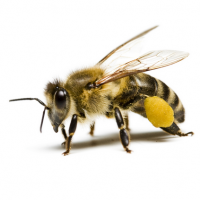High-Tech Bee Hives and the IoT, Sweet!

The Internet of Things is getting smarter, integrating circuits and sensors into so much more of our lives that it’s predicted 20+ billion devices will be running the IoT by 2020. Besides smarter thermostats and watches, hopefully there will be devices that help save our planet—including our bees.
By now, most of us are aware that the honey bee population is in decline, which is pretty significant since it poses a real threat to the nation’s food production. Honey bees pollinate at least 90 commercially grown crops in North America. However according to the United States government, the number of managed honey bee colonies in the United States has dropped from 6 million beehives in 1947 to around 2.5 million today.
What’s happening to the bees? Colony collapse disorder (CCD), which causes a rapid and catastrophic loss of bees in a hive, contributes to the dramatic drop in bee population. Apparently it’s a combination of stressors: the loss of their natural food supply, not enough genetic diversity, some pesticides, and diseases such as Varroa mite infestations.
One potential technology solution in the early stages of development involves a biodegradable circuit board that, instead of pesticides, uses heat to sterilize and eventually eliminate the Varroa destructor mites in honey bee colonies. According to the announcement from machine-to-machine (M2M) communications company Eltopia, the “MiteNot” frame has a wax covered compostable circuit board that senses the stages of the bee broods’ reproductive cycle.
Heat is applied at the optimal time, which is when female mites have laid their eggs, but before male mites can fertilize them. The mites’ lifecycle is interrupted without harming the bees. Only one smart frame per hive is needed. The device monitors the temperature of more than thirty elements within the hive, reports the EDN Network.
The device is currently being tested at the University of Minnesota's Bee Lab. And if you’re interested, here’s a TED Talk with bees scholar and researcher Marla Spivak, Distinguished McKnight University Professor Apiculture/Social Insects, University of Minnesota.

